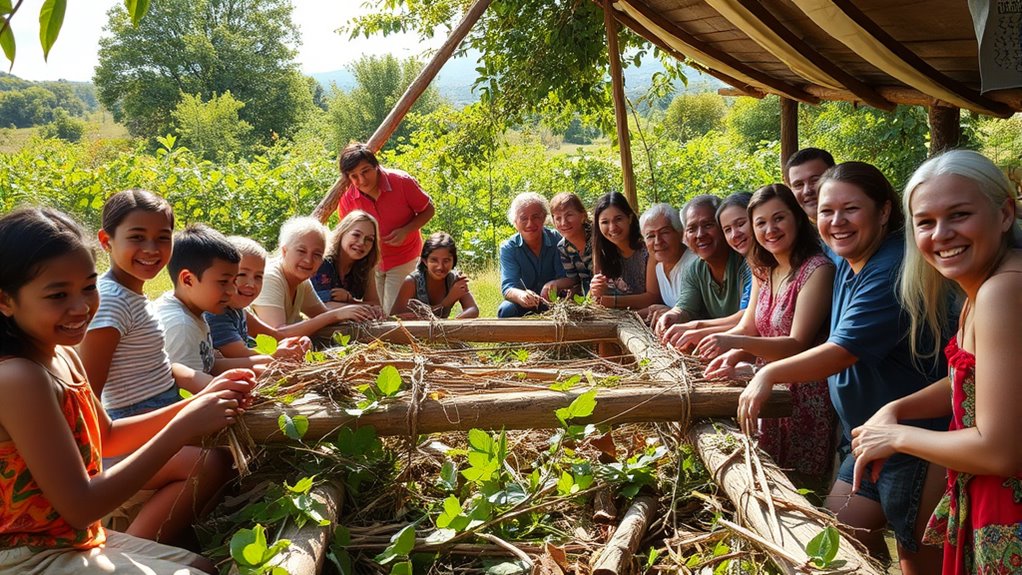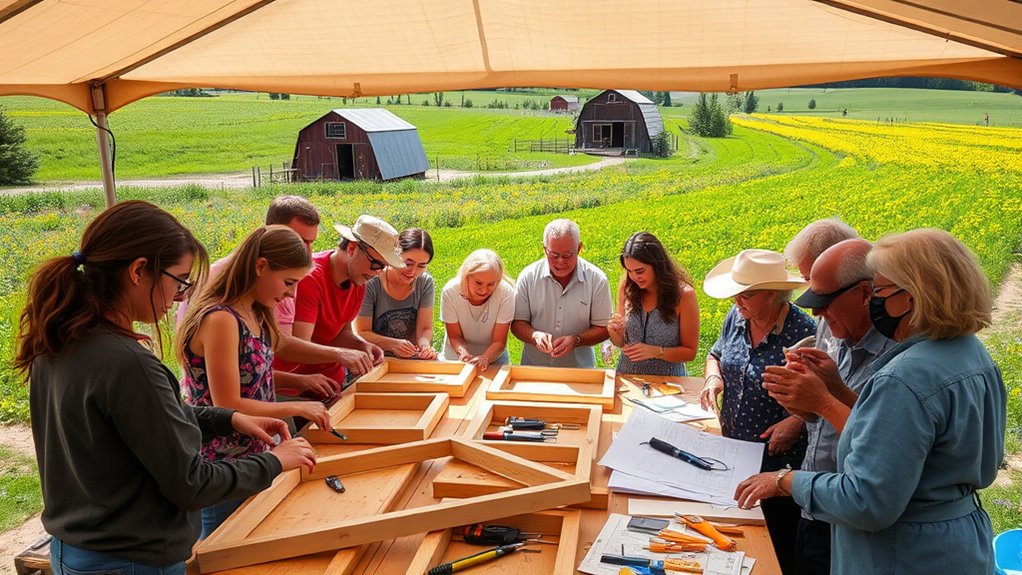Shelter-building workshops are gaining popularity in rural areas, providing you with practical skills to enhance housing quality. You’ll learn to use local materials, which not only cuts costs but also supports your community. These workshops create sustainable income opportunities for builders while engaging participants in hands-on training. Plus, technology helps share valuable building techniques. If you’re interested in how these initiatives can transform your community, there’s more information waiting for you.
Key Takeaways
- Hands-on training enhances construction skills, enabling rural participants to build durable and safe homes effectively.
- Workshops utilize local materials, supporting the economy and promoting sustainable building practices.
- Income-generating activities incorporated into shelter projects create sustainable livelihoods for local builders.
- Community engagement fosters non-agricultural job creation, contributing to local economic development and poverty reduction.
- Digital resources bridge knowledge gaps, allowing builders to access techniques and share experiences for improved construction outcomes.

Shelter-building workshops offer invaluable hands-on training for anyone enthusiastic to enhance their construction skills and create durable homes. In rural areas, these workshops have gained traction, providing local tradesmen with the skills they need to improve the quality of shelters. You’ll find that the training not only focuses on construction techniques but also introduces appropriate technologies that guarantee buildings are safe and long-lasting.
By using locally sourced materials, these workshops help reduce costs while simultaneously supporting the local economy. You’ll learn how to make the most of your resources, fostering a sense of community and sustainability. As you engage in practical exercises, you’ll discover how local materials can be both effective and environmentally friendly, further enhancing the quality of the homes you help to build.
Another notable aspect of these workshops is their ability to incorporate income-generating activities. You’ll see how shelter improvement projects can create sustainable incomes, allowing local builders to thrive. These initiatives don’t just stop at construction; they encourage partnerships between shelter and rural production agencies, fostering collaboration that can lead to even greater community development.
Moreover, community engagement is an essential component of these workshops. You’ll witness firsthand how shelter improvement can be integrated into broader community development efforts, creating non-agricultural jobs and supplementing agricultural income. The construction activities contribute considerably to local economies, helping to reduce rural poverty and offer new opportunities for those involved.
Digital resources also play a key role in the success of these workshops. By utilizing digital platforms, information about shelter-building techniques can be easily disseminated. You’ll find that the integration of modern technology into traditional practices helps bridge gaps in knowledge, enabling builders to access valuable resources and share their experiences with others.
Frequently Asked Questions
What Materials Are Typically Used in Shelter-Building Workshops?
In shelter-building workshops, you’ll typically use a variety of materials. For frames, wooden stakes, logs, and sturdy branches are common choices.
When it comes to roofing, tarps and pine boughs provide excellent coverage and insulation.
You’ll also need binding materials like rope or paracord to secure your structure.
Tools such as saws and machetes can help shape your materials, ensuring you create a sturdy, functional shelter for your needs.
How Long Do Shelter-Building Workshops Usually Last?
Did you know that some shelter-building workshops can last up to 28 days?
Generally, these workshops vary in duration to suit different needs. You might find short courses lasting just 3 days, while more intensive programs can extend to a week or longer.
Regardless of the length, each workshop offers valuable hands-on experience, allowing you to learn essential skills in shelter construction, fire crafting, and adapting to various environments.
Are There Age Restrictions for Participants in These Workshops?
Yes, there are age restrictions for participants in these workshops.
Some require you to be at least 15 years old, while others mightn’t have a specific minimum but need adult supervision for minors.
If you’re under 18, parental permission is often necessary.
Many programs are designed for adults, with some requiring participants to be 18 or older.
Always check the specific workshop’s rules to verify you meet the age requirements.
What Skills Are Taught During Shelter-Building Workshops?
Imagine standing in a forest, surrounded by towering trees, as you learn to construct a sturdy shelter with your own hands.
In shelter-building workshops, you’ll master essential skills like using local materials, enhancing their quality, and designing functional spaces.
You’ll engage in hands-on projects, focusing on sustainability, while collaborating with others.
You’ll also gain insights into managing woodland and creating structures that blend with the natural environment, all while fostering community connections.
How Can I Find a Shelter-Building Workshop Near Me?
To find a shelter-building workshop near you, start by checking online platforms like event calendars and directories.
Visit local community centers since they often host these workshops.
Following outdoor and survival groups on social media can keep you updated on upcoming events.
Don’t hesitate to ask local residents or outdoor enthusiasts for recommendations, too.
Connecting with organizations focused on outdoor skills can also lead you to valuable resources and workshop opportunities.
Conclusion
To summarize, shelter-building workshops spark significant support in rural regions, bringing communities together. These hands-on hubs help harness hope and hands-on skills, fostering friendships and fortifying foundations. As you participate, you’ll find yourself not just constructing shelters, but also cultivating connections and confidence. So, immerse yourself in these dynamic days, and discover the delightful difference you can make. Together, let’s build brighter, better beginnings for all!










